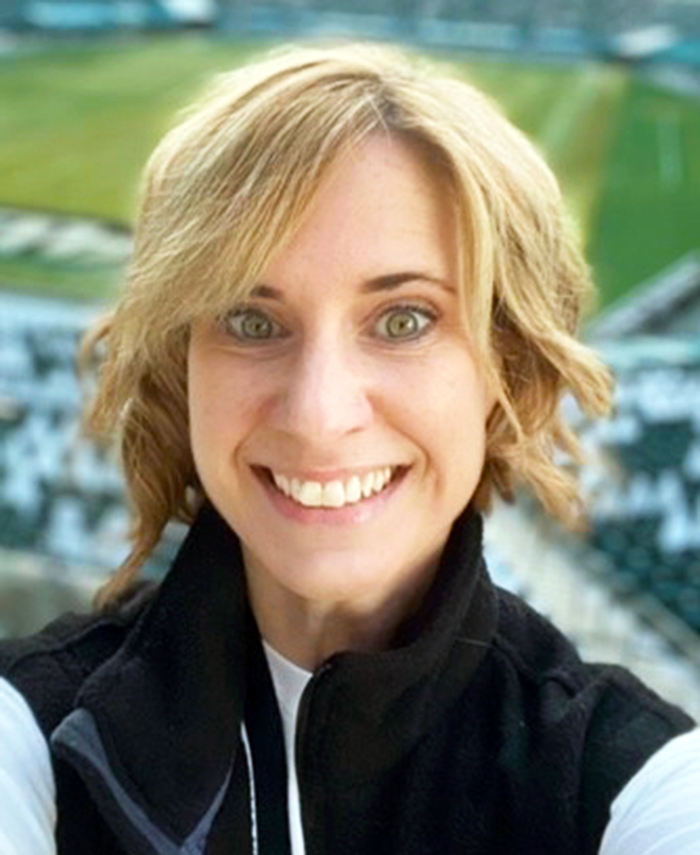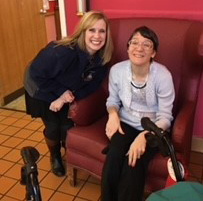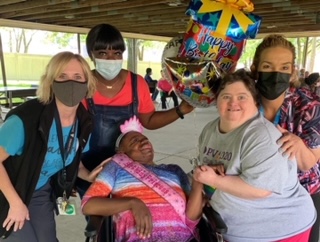
Angela Babcock, the new administrator of the archdiocesan Divine Providence Village, said individuals with intellectual and developmental disabilities are teachers of “trust, love and friendship.” (Courtesy of Angela Babcock)
Persons with disabilities are “gifts” to be treasured, said the new director of an archdiocesan care facility.
“They have a lot to teach us about trust, love and friendship – and we have a lot to learn,” said Angela Babcock, the incoming administrator of Divine Providence Village (DPV).
Operated by archdiocesan Catholic Social Services (CSS), the Springfield-based DPV — a beneficiary of the annual Catholic Charities Appeal — provides health and rehabilitative services to adult women with intellectual and developmental disabilities (IDD).
The facility is part of CSS’s broader Communities of Don Guanella and Divine Providence (DGDP), which offer a continuum of IDD support through community and campus-based living arrangements, life sharing through family living, in-home assistance, respite care and day programs.
When Babcock steps into her new role on Oct. 15, she’ll actually be settling in more deeply at a place she’s long called a second home.
For the past six years, Babcock has been DPV’s director of nursing, managing a staff of 40 employees. At the onset of the COVID pandemic, she regularly logged 75-hour weeks at her station, educating herself and staff about the rapidly advancing disease, while soothing frayed nerves and allaying residents’ concerns.
[hotblock]
“We came together and did what we had to do,” said Babcock, a member of St. Francis of Assisi Parish in Springfield. “We couldn’t stop to wait for the perfect plan. We had to create best practices while serving those in need.”
One of those best practices was ensuring staff and residents had access to COVID vaccines. With a much higher rate of multiple chronic conditions, the IDD population has been particularly vulnerable to the coronavirus, and Babcock threw her energies into securing supplies of the Moderna and Pfizer doses.
Along with outgoing DPV administrator Jean Calvarese-Donovan, Babcock arranged for the facility to become a vaccination provider, and expanded that reach last March with an autism-friendly clinic at Lincoln Financial Field, complete with quiet rooms, visual schedules and story-based interventions to accommodate recipients and their caregivers.
The initiative, made possible through a partnership with the Eagles Autism Foundation, saw 1,000 full doses administered. Three Philadelphia City Councilmembers and a slate of IDD community advocates cited the clinic in a letter to Mayor Jim Kenney as a model to be replicated, while the Philadelphia Phillies named Babcock a frontline hero.

Angela Babcock, the new administrator of Divine Providence Village, is seen with a resident in this undated photo. (Courtesy of Angela Babcock)
By May, Babcock and her team had fully vaccinated some 7,000 in the area’s IDD community, while also helping to make COVID jabs available to deaf and hard of hearing individuals.
But that kind of outreach is just a start, said Babcock, who envisions DPV widening its embrace of the IDD population.
“I jotted down every single contact I made from those vaccination clinics,” she said, adding that by “going more into the community,” DPV can lead the way in “serving the medically fragile in a variety of settings, not just the easiest ones.”
Eventually, Babcock would like to create “the first IDD skilled rehab facility” at DPV, one that could accommodate “people in the local community as well as residents.”
Demand for such support is on the rise as life expectancy for the IDD population lengthens. By 2030, the number of adults with IDD age 60 and older is projected to reach some 1.2 million.
“This is really the first IDD generation living this long,” said Babcock, noting that one DPV resident is now 92.

Individuals with intellectual and developmental disabilities “have many more talents than most give them credit for,” said Angela Babcock. (Courtesy of Angela Babcock)
Under COVID lockdowns, “we proved that we could rehab people here,” she said. “We have the talent and the commitment and the core values here to say, ‘Hey, world, this is how it’s done.’”
Babcock is also committed to deepening DPV’s holistic approach to caring for its residents.
“We’re focusing on a lot of preventative things, like strength conditioning and exercise,” she said.
From a programming perspective, Babcock is encouraging her team to “think outside of the box,” drawing on input from those at the center of DPV: the residents themselves.
“We’re looking at goals for them that go beyond what people might typically think would be good,” she said. “Our residents tell us where they want to travel, what music they like. They tell us a lot about themselves in their journey, and they have many more talents than most give them credit for.”
As a result, Babcock said she finds herself inspired on a daily basis – even on the most challenging days.
“Any time it gets hard, I remember that God knew us before he formed us in the womb,” she said. “So we must be chosen to do great things.”
PREVIOUS: In run for Pa. governor, Guy Ciarrocchi sees link of religion and politics
NEXT: Retired priest’s owl collection leads to children’s book series


Share this story